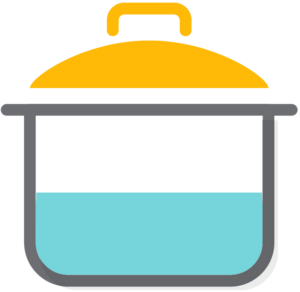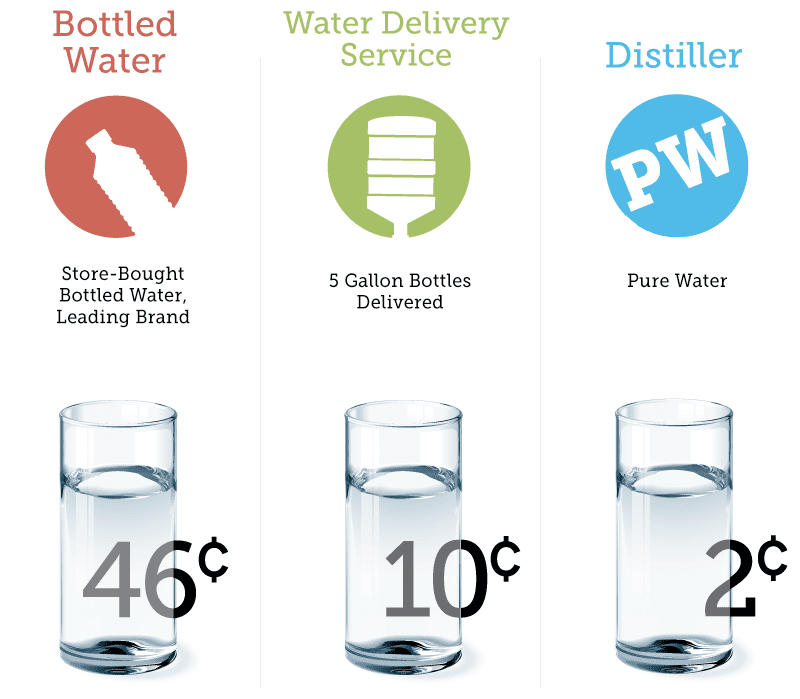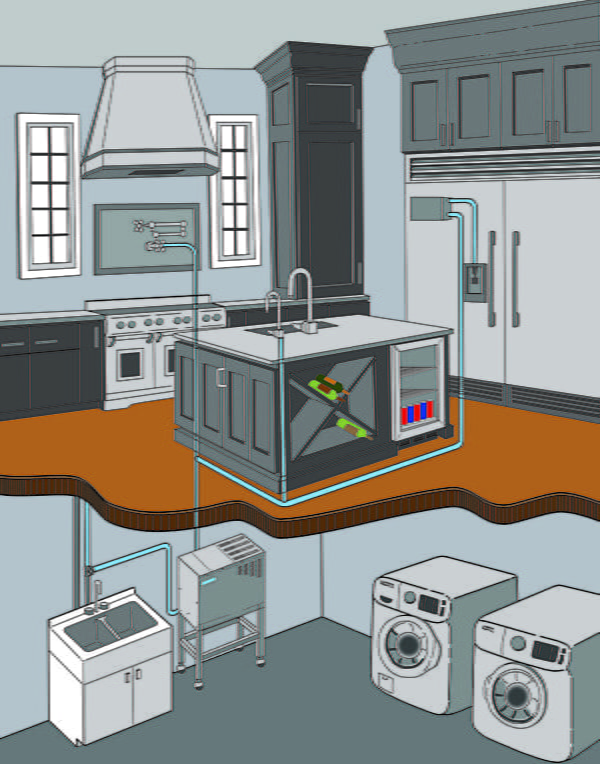If you are looking for instructions on how to make distilled water, you’ve come to the right place! While you can distill water using items likely to be found in your kitchen, it is much easier to purchase a Pure Water Distiller.
Step 1: Fill a large (1 – 5 gallon) stainless steel pot half way with water
Step 2: Place an oven safe glass bowl inside so that it floats (don’t let it touch the bottom). If necessary, place the bowl on a wire baking rack.
Step 3: Heat the water to a low, steady boil.
Step 4: Place a clean stainless steel lid upside down onto the pot and fill it with ice. The ice will make the lid cold and cause the steam / water vapor to condense against the bottom of it and drip into the bowl.
Step 5: Let the distilled water collect in the bowl – do not let the pot boil dry.
Step 6: Carefully remove the pot from the heat source and wait for it to cool.
Step 7: Remove your bowl of clean distilled water and pour it into a glass container for storage.
Note: You will need to stay close to manage the process.
Why Drink Distilled Water?
Distillation, as a method for water purification, is by far the most effective and reliable process for removing contaminants from any water source. Much like the Hydrologic Cycle, nature’s own process of purifying water, distillation begins with evaporation.
To get your water to evaporate, you will need to bring it to a low boil. It’s important to note that boiling is actually just the beginning of the purification process. While it kills viruses and most bacteria, bringing water to a boil does nothing to remove other common toxins such as organic and inorganic chemicals, heavy metals, and volatile gasses. In fact, it actually concentrates these toxic pollutants. Consider cooking, for example. When you want to intensify a flavor, you reduce it, meaning you simmer or boil it until most of the liquid is released, and you’re left with the concentrate. So, going no further than the boiling stage leaves your tap water with a concentrated amount of – you guessed it– toxins!
Advantages of an Pure Water Home Water Distiller
An Pure Water Home Water Distiller has many advantages over making batches of distilled water using a pot, bowl and ice.
1. You don’t have to be present when you are using an Pure Water Home Water Distiller.
2. You can make multiple batches a day with a countertop machine or automate it by purchasing an automatic water distiller.
3. The automatic water distillers have a built in storage tank for convenience and make more water as needed.
4. Our post carbon filters trap VOC’s and other contaminants that might slip past the boiling/condensing process.
A Closer Look at Organics, Inorganics, and Heavy Metals Commonly Found in Tap Water
Organics
The word organic often confuses people. After all, isn’t something “organic” supposed to be good for you? Actually, in this case, organic refers to carbon-based chemicals including solvents, pesticides, and insecticides that make their way into our water through cropland runoff and factory discharge.
Inorganics
Technically, any compound lacking a carbon atom is classified as inorganic. This category includes, by far, the greatest number of chemical contaminants in drinking water. Examples include chlorine, boron, and cyanide.
Heavy Metals
Heavy metals such as mercury, lead, and arsenic are also inorganic – they’re found naturally in the earth, but can cause serious health problems when ingested through food or drink. You’ve probably heard about lead leaching out of old pipes in cities like Flint, MI and Sacramento, CA. Crises like these can, and do, happen more than you might think. This is why it’s so important to purify your water. Distillation will remove lead from water as well as other heavy metals.
Cysts
Microbial cysts, the resting or dormant state of microorganisms, can be lurking in your water. Examples would be cryptosporidium or giardia. In 1993 there was a huge outbreak of cryptosporidium in Milwaukee Wisconsin in which 1.6 million residents became ill. 104 people died as a result.
How Does the Distillation Process Work?
As we know, when water is heated to its boiling point (212 F), it vaporizes. (Think of it as “vapor” “rises”.) As it rises, it leaves behind any contaminant with a higher boiling point. That includes toxic chemicals, metals, and minerals. The pure vapor then condenses back to water which drips into a container and collected for drinking. Essentially, you are removing clean water from the contaminants.
Distillation is, by far, the superior method by which water is purified. But obviously, no one has the time or energy to hang around the stove all day to ensure the safety of their water supply. Fortunately, there is a much easier, fool proof method for having 99.9% contaminant-free vapor distilled water available in our homes on a daily basis!
Why Buy a Pure Water Distiller?
Our Pure Water distillers bring peace of mind to countless families around the world, protecting them from exposure to potentially contaminated water. Not only that, but over 100 U.S. Embassies count on our steam distilled water distiller machines for protection from poor water conditions and potential terror threats to their drinking water supplies.
Cost of Distilled Water in Your Home
The cost is only slightly less than 2 cents per 8 oz. glass. (Based on an electrical rate of 10 cents per KWH). This is much less than bottled water or Reverse Osmosis systems, which tend to waste a lot of water. In fact, some systems can waste as much as four gallons of water per one gallon of clean water.
Durable & Long Lasting
Our high grade stainless steel units are made to last right here in the U.S.A., and we stand solidly behind them with an exclusive warranty of 15 years on stainless steel and 2 years on electrical components. That means years of worry free pure vapor distilled water for you and your family.
Distilled Water Tastes Fantastic
Pure Water tastes great. Don’t confuse our vapor-distilled water with the water you buy for your iron. Our water is clean and crystal clear with no strange odors, colors, U.F.O’S (unidentified floating objects), stale taste or plastic taste from bottles. Each distillation system has a final carbon post-filter that removes any volatile organic compounds that might affect taste or smell. Plus, making distilled water at home is a breeze with a Pure Water Distiller.
Stovetop vs. Water Distillation Machine / Unit
What you get with a water distillation machine is great tasting water with little to no effort. Maintenance is minimal, and many of our distillers have been in use for more than 20 years. We have a wide range to choose from including countertop water distillers to larger automatic water distillers that pump 99.9% contaminant free, pure, vapor distilled water that you can pump your sink, fridge, and ice maker. Without a doubt, a Pure Water® distiller is the best way to produce distilled water. It’s definitely easier than making it on your stovetop!








I always wondered how drinking distilled water benefits us. Thank you for making it clear to me that heavy metals are naturally found in our water and this can cause serious health problems. I surely want to have a peace of mind that my family stay healthy.